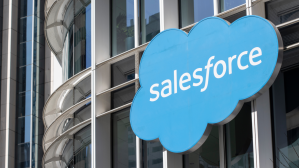Jujhar Singh joined Salesforce in 2017 to help lead Salesforce’s newly launched industries business. Now EVP and GM of Salesforce Industries, Jujhar oversees a business unit that has grown to account for an approximate annualized revenue run-rate of $2 billion.
We asked Singh to discuss how industry-specific clouds help companies navigate complex, regulated environments, and how Salesforce is helping companies across sectors reimagine their respective industries.
Q. Salesforce’s first industry clouds celebrate their fifth anniversary this year. How would you describe Salesforce Industries and how it fits inside Salesforce?
Salesforce has been selling to industries for over 15 years and has been on the industries cloud journey for the last five of those.
In every industry’s case, we have built industry-specific data models along with analytical and artificial intelligence (AI) elements. And what is also unique is we go even deeper at the segment level with tailored solutions for each subvertical. So if we are talking about financial services, we have an offering for insurance, which is different from our offering for wealth management, which is different from our offering for corporate and investment banking.
Even within the same industries, there are different needs. We understand this and we build towards it.
Q. Tell us how Salesforce Industries has evolved over the last five years?
We started this journey back in 2013, when we started working with our partner ecosystem to help us build the industry-specific elements. We were investing in go-to-market resources, but we weren’t making product investments yet.
In 2016, we started to heavily invest in building industry-specific products and clouds, beginning with Financial Services Cloud and Health Cloud.
In 2018, we really ratcheted that up; we have been doubling down on our investment every year since then. In 2019, we launched three new clouds for manufacturing, consumer goods, and the public sector. And then in 2020, we brought our Salesforce.org clouds and Vlocity into our ecosystem.
Vlocity brought in thousands of industry experts and allowed us to open up new industry segments including communications, media, energy and utilities, and enhanced our Health and Financial Services Clouds. And Salesforce.org brought in Nonprofit, Education and Philanthropy Clouds.
Now we have 12 industry clouds and targeted sub-segments within these industries.
“In every industry’s case, we have built industry-specific data models along with analytical and artificial intelligence (AI) elements.”
Jujhar Singh, EVP & GM, Salesforce Industries
Q. An industries-specific approach seems to be increasingly popular across the enterprise tech landscape. What makes Salesforce’s approach to industries unique?
This is a very hot space right now, but it’s one that we’ve been investing in since 2016. In our Health and Financial Service Clouds, for example, we’re on our sixteenth product release.
If you look at the traditional approach to building for industries, it was, “let’s put together an accelerator for industries,” which means a very lightweight solution.
At Salesforce, an industry-specific cloud approach means not only speaking the language of our customers in their industry, but making sure that the products do the same. In our minds, the industry product model has to be deep. It has to be at all layers of the stack, from the data model to processes to AI.
Furthermore, we are not only accelerating digital transformation with purpose-built solutions, but we’re also re-imagining different industries by working closely with our customers.
And it’s not just the product cloud or the industry cloud that is relevant, it’s the entire ecosystem. Salesforce has this rich ecosystem with partners that have built over 700 apps and provide expertise to thousands of people.
Q. How does Salesforce share the innovations and best practices developed for one industry with the rest of your industry portfolio?
Our industry clouds are built on the same infrastructure, meaning we can take elements from one industry and apply those best practices to another industry. Every industry we work with wants to know how they can learn from others.
I’ll give you a good example. Take insurance, which falls within financial services. The agents in that sector are always interested in key life events: Was your kid just born? Have they left for college? They are tracking those events and are following up on them.
That same concept applies to an industry like healthcare. The events may be different, but the elements of the follow up to those life events are key. In the case of healthcare, an individual may have surgery and a series of appointments and rehabilitation that follows. That is a significant life change and requires follow up.
So while we build workflows for one industry, these common best practices can be shared across industries. And there are multiple examples of us doing that.
Q. How does Salesforce leverage Hyperforce when it comes to compliance and regulations across so many different industries?
Each regulated industry comes with its own idiosyncrasies, and compliance is a huge part of it.
Trust is one of our leading values at Salesforce. In each industry, we check and make sure we meet compliance standards, including HIPAA in healthcare or FINRA in financial services.
We heavily invested in our Salesforce Hyperforce architecture, which has built-in security. It gives us the ability to go into different geographies, so that we can meet the residency requirements in a much, much bigger fashion.
We’re not just checking the box on every compliance and regulation needed, that’s industry standard. The special sauce is really in how you make compliance easier for employees.
The front office worker just wants to do his job unfettered while the compliance officer wants to make sure that the front office worker is meeting all the compliance requirements. We build this right into the product so that compliance is that much easier.
Q. How has Salesforce helped its industries customers over the course of the pandemic?
If you ask a customer if they want an industry-specific version of a product, they’re always going to say yes so that they don’t have to customize or configure anything. It’s available for them to use right out of the box. The time to value for the customer is extremely low.
COVID-19 accelerated this desire. These are tools that help customers go live faster. Mascoma Bank is a great example. They’re a bank in New Hampshire and because of the pandemic, they had to process small business loans as part of the Paycheck Protection Program. They used Financial Services Cloud and our partner, nCino, to process these urgent loans in the span of 13 days, which is the same volume of loans they typically process over an entire year. This was done leveraging a new loan request and processing experience built in just 10 days.
“Mascoma Bank…had to process small business loans as part of the Paycheck Protection Program. They used Financial Services Cloud and our partner, nCino, to process these urgent loans in the span of 13 days, which is the same volume of loans they typically process over an entire year.”
Jujhar Singh, EVP & GM, Salesforce Industries
It’s a great example of how industry-specific solutions actually give our customers the ability to digitally transform.
Q. Today we announced new innovations in Financial Services Cloud — why are you excited about these innovations?
We’ve added specializations to the Financial Services Cloud by going deeper into corporate and investment banking. Investment bankers who are working on an acquisition for a client need to collaborate with large research teams without disclosing the full purpose of the research. Compliance is facilitated by precision data sharing based on rules and access levels defined by material non-public sharing framework. So we have built all of that right into the product.
We’ve also integrated AI. With investment research being very manual and unstructured, it usually takes up a lot of time for bankers. With the newly launched Einstein Relationship Insights we have AI-driven automated relationship discovery from different data across the web, unstructured internal information and CRM records. With the help of your own AI bot that mimics your manual research steps, finding unanticipated relationships and insights becomes a breeze.
We’re not just moving their work to the cloud, we’re redefining how these industries work. Industry-specific AI is a big part of how we’re reimaging these industries and we’ll be continuing to add innovations like this across our industry clouds.
To learn more about the latest news from Salesforce Industries, check out our Industries Summit registration page and our news announcement.















